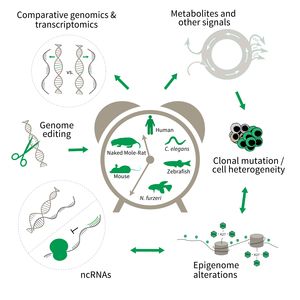Subarea 3: Genetics and Epigenetics of Aging
The focus of Subarea 3 is on genetic and epigenetic determinants of life- and health span as well as aging in fish, rodents and humans. This line of research builds on the expertise of the institute in comparative and functional genomics.
The research is defined by five focus areas:
- Comparative genomics in short- and long-lived models of aging,
- Genomic engineering in N. furzeri,
- Epigenetics of aging,
- Non-coding RNAs in aging, and
- Comparative transcriptomics of aging.
Research focus of Subarea 3.
To uncover causative factors for aging, comparative genomics in short- and long-lived model systems are applied. Functional genomics is used to identify novel pathways contribute to aging of an organism and to validate the functional relevance of genetic and epigenetic changes that occur during aging. Furthermore, genetic risk factors for aging-related diseases are identified and functionally tested. The future development of the Subarea aims to integrate changes in host-microbiota interactions during aging, and how these influ ence clonal mutation and epigenetic alterations through metabolites and other signals.
Publications
(since 2016)
2022
- Small Extracellular Vesicles from Peripheral Blood of Aged Mice Pass the Blood-Brain Barrier and Induce Glial Cell Activation.
Morales-Prieto DM, Murrieta-Coxca JM, Stojiljkovic M, Diezel C, Streicher PE, Henao-Restrepo JA, Röstel F, Lindner J, Witte OW, Weis S, Schmeer C, Marz M
Cells 2022, 11(4), 625 - Characterization of Novel α-Mangostin and Paeonol Derivatives With Cancer-Selective Cytotoxicity.
Nunna S, Huang YP, Rasa M, Krepelova A, Annunziata F, Adam L, Käppel S, Hsu MH, Neri F
Mol Cancer Ther 2022, 21(2), 257-70 - Carbon fixation rates in groundwater similar to those in oligotrophic marine systems
Overholt WA, Trumbore S, Xu X, Bornemann TLV, Probst AJ, Krüger M, Herrmann M, Thamdrup B, Bristow LA, Taubert M, Schwab VF, Hölzer M, Marz M, Küsel K
NAT GEOSCI 2022, 15, 561–567 - YBX1 mediates translation of oncogenic transcripts to control cell competition in AML.
Perner F, Schnoeder TM, Xiong Y, Jayavelu AK, Mashamba N, Santamaria NT, Huber N, Todorova K, Hatton C, Perner B, Eifert T, Murphy C, Hartmann M, Hoell JI, Schröder N, Brandt S, Hochhaus A, Mertens PR, Mann M, Armstrong SA, Mandinova A, Heidel FH
Leukemia 2022, 36(2), 426-37 - Inflammaging is driven by upregulation of innate immune receptors and systemic interferon signaling and is ameliorated by dietary restriction.
Rasa* SMM, Annunziata* F, Krepelova A, Nunna S, Omrani O, Gebert N, Adam L, Käppel S, Höhn S, Donati G, Jurkowski TP, Rudolph KL, Ori A, Neri F
Cell Rep 2022, 39(13), 111017 * equal contribution - The sources of sex differences in aging in annual fishes.
Reichard M, Blažek R, Žák J, Cellerino A, Polačik M
J Anim Ecol 2022, 91(3), 540-50 - Aging Activates the Immune System and Alters the Regenerative Capacity in the Zebrafish Heart.
Reuter H, Perner B, Wahl F, Rohde L, Koch P, Groth M, Buder K, Englert C
Cells 2022, 11(3), 345. doi: 10.3390/cells11030345 - Molecular Sexing of Nothobranchius furzeri Embryos and Larvae.
Richter A, Krug J, Englert C
Cold Spring Harb Protoc 2022, 2022(12), doi: 10.1101/pdb.prot107782 - Network analysis of hepatocellular carcinoma liquid biopsies augmented by single-cell sequencing data.
Safrastyan A, Wollny D
Front Genet 2022, 13, 921195 - PLCG1 is required for AML1-ETO leukemia stem cell self-renewal.
Schnoeder TM, Schwarzer A, Jayavelu AK, Hsu CJ, Kirkpatrick J, Döhner K, Perner F, Eifert T, Huber N, Arreba-Tutusaus P, Dolnik A, Assi SA, Nafria M, Jiang L, Dai YT, Chen Z, Chen SJ, Kellaway SG, Ptasinska A, Ng ES, Stanley EG, Elefanty AG, Buschbeck M, Bierhoff H, Brodt S, Matziolis G, Fischer KD, Hochhaus A, Chen CW, Heidenreich O, Mann M, Lane SW, Bullinger L, Ori A, Eyss Bv, Bonifer C, Heidel F
Blood 2022, 139(7), 1080-97









